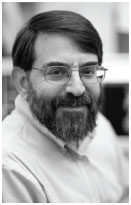
Error: No layouts found

Steven C. Almo, Ph.D., an internationally recognized leader in the field of structural biology, has been named chair of the department of biochemistry at Einstein. Dr. Almo is a professor of biochemistry and of physiology & biophysics and holds the Wollowick Family Foundation Chair. Dr. Almo will assume the chair left vacant by Vern Schramm, Ph.D., who led the biochemistry department for 28 years. Dr. Schramm will return to his lab full time.
Dr. Almo joined Einstein in 1992 and has been an active member of the Albert Einstein Cancer Center since 1996. In 2007, he became the director of Einstein’s Macromolecular Therapeutics Development Facility, a shared facility that provides expertise for developing and optimizing protein-based therapeutics and supports high-throughput automated development, analysis and production of proteins.
His laboratory determines the shapes and structures of proteins to better understand their function and advance the development of therapeutics. His work on enzyme function is offering insights into the gut microbiome’s contributions to human health, providing new chemical processes for industry and expanding understanding of critical environmental issues such as global nutrient cycles and how complex microbial communities evolve. His research on molecular mechanisms involved in immunity are leading to novel immunotherapy strategies and compounds for treating infectious diseases, autoimmune diseases and cancers.
Dr. Almo received his first major independent research grant in 1993 and since then has been continuously funded as a principal investigator by the NIH. His research is currently supported by two major NIH grants with annual funding totaling approximately $6.8 million.
To learn about Dr. Almo’s most recent grant, which will support his work in mapping the “ectointeractome” (the entire set of interactions involving secreted and cell-surface proteins), see Major NIH Research Awards.

Jonathan M. Backer, M.D., an internationally acclaimed molecular pharmacologist and sought-after mentor to promising young scientists, will chair the department of molecular pharmacology at Einstein. Dr. Backer is a professor of molecular pharmacology and of biochemistry and the William S. Lasdon Chair in Pharmacology. The department’s prior co-chairs were Susan B. Horwitz, Ph.D., and Charles S. Rubin, Ph.D.
Dr. Backer will step down from his position as director of the Belfer Institute for Advanced Biomedical Studies, which integrates all postdoctoral training programs at Einstein. Anne R. Bresnick, Ph.D., will succeed him.
Dr. Backer joined the Einstein faculty in 1993 as an assistant professor of molecular pharmacology, was promoted to professor in 2002 and was named director of the Belfer Institute in 2008.
His research focuses on a group of enzymes called phosphoinositide (PI) 3-kinases. These enzymes sense when certain cell-surface receptors receive signals and then relay those signals into the cell. This makes the PI 3-kinases important regulators of key cellular processes such as proliferation, motility, apoptosis, vesicular trafficking and insulin signaling. Mutations that activate PI 3-kinases are linked to the genesis and spread of several types of human cancers. Dr. Backer studies the molecular mechanisms that regulate PI 3-kinase activity and the role of PI 3-kinases in the aberrant intracellular signaling involved in diabetes, cancer and aging. His work is supported by an NIH program project grant, two NIH R01 grants, an Innovation Award from the American Diabetes Association and the Department of Defense’s Prostate Cancer Research Program.
Drs. Horwitz and Rubin will return to their research full-time.